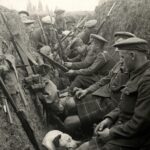by Lena Ng
Previously published in the Quilliad Issue 9, Oct. 2017
The suburban yards were reverting back into the forest. The Tams’ burgeoning oak tree shed its leaves, scattering orange, red and yellow, coming to land and rot in my backyard. I watched them flutter and spiral as I sat in my Muskoka chair, taking a few minutes to enjoy the breeze.
The roof of the Tams’ house had a large hole in it, and the raccoons came and went, their black eyes examining me as I examined them. The house of my other former neighbours, the Lakanis, had its windows boarded up, though to what purpose, I don’t know. There was no one left to do any looting. The houses in the Beaches neighbourhood, once so expensive, now settled in some stage of decomposition, their owners long since absconded, or dead.
I slung the shot-gun over my shoulder and headed back into the house. After closing the sliding door, I locked it and replaced both broom handles, wedging them in the track between the door and wall. I hadn’t been attacked in years, but I could never be too careful. I propped the shot-gun against the wall beside the door.
I headed down to the basement, sat down on the stool beside my mother ‘s
metal-frame bed, and dipped the wash cloth into the bucket, wringing out the excess water. Picking up one of my mother ‘s shriveled arms, the skin pale and thin, I ran the cloth over it, taking care to avoid her snapping teeth. The restraints rubbed a raw ring around her wrists and ankles.
She may never die. Or she may be already dead. But every day, I come down to the basement and wash her and feed her congee or winter melon soup. I use an over-sized spoon since my hands are clumsy from wearing rubber gloves. In case she does manage to get in a bite, I pray they will be enough to prevent her from breaking the skin.
A brochure from the Toronto Public Health, the corners yellowed and curled with age, lay on the floor, next to my King James Bible. I glanced over it, although I have already read it many times before, what little good it has done for me and my family.
Because the natural reservoir host of D780 virus has not yet been identified, the manner in which the virus first appears in a human at the start of an outbreak is unknown. However, researchers believe that the first patient became infected through contact with an infected animal.
When an infection does occur in humans, the virus can be spread in several ways to others. D780 is spread through direct contact (through broken skin or mucous membranes in, for example, the eyes, nose, or mouth).
IF YOU KNOW OF ANYONE BITTEN, ISOLATE THE PATIENT AND CALL THE TORONTO PUBLIC HEALTH IMMEDIATELY.
I know I should have called the number on the brochure when she was first infected. But I saw what the y did to my father and sister. The men in the Hazmat suits came and took them away, and I never saw them again. Later, I found out they had burned the bodies.
“Mom,” I said as she writhed in the restraints, “everything’s going to be okay.”
But really, I didn’t know.
She gave no sign she recognized me, her eyes an opaque white, whiter than when she had cataracts. I still spoke to her, although she could no longer speak. Only strangled sounds came from her throat. She reminded me of my grandmother who used to live with us until she passed. She couldn’t speak English and I couldn’t speak Hakka, but somehow we always understood each other. She would hold my hands, kiss my cheeks, and her skin smelled of Tiger Balm. She would make steamed buns and fold countless wontons. I would help her — a spoonful of ground meat in the centre of the wonton wrap, fold the wrap in half, dab water on one corner so it would stick to the other corner. Repeat until all the wontons were made then boil them in soup.
Over the years, my grandmother developed dementia and needed constant care. My mother looked after her without complaint, washing her emaciated body, coaxing spoons of congee into her mouth. “A daughter ‘s duty,” my mother used to say. “A burden of love.”
Any day now, the scientists will come up with a cure. For nine years, they have been saying this. Any day now.
“Believe in God,” my mother had begged me, after she had been bitten.”Pray for me.”
I look after her as she did for me when I was child, and I have my memories to sustain me.
When I was young, my parents used to take me to Wasaga Beach. We’d eat fried chicken, our fingers oily from the grease, and dessert was cubed pieces of ripe watermelon from a Tupperware container. My sister and I would play in the shallow waves. This was years before the virus emerged from the jungle and shrouded the earth. Before D780, when the water was blue, the sand warm, and the air was bright and clean.
Lena Ng lives in Toronto, Ontario. She has short stories in fifty publications including Amazing Stories. “Under an Autumn Moon” is her short story collection. She is currently seeking a publisher for her novel, Darkness Beckons, a Gothic romance.



Add your first comment to this post